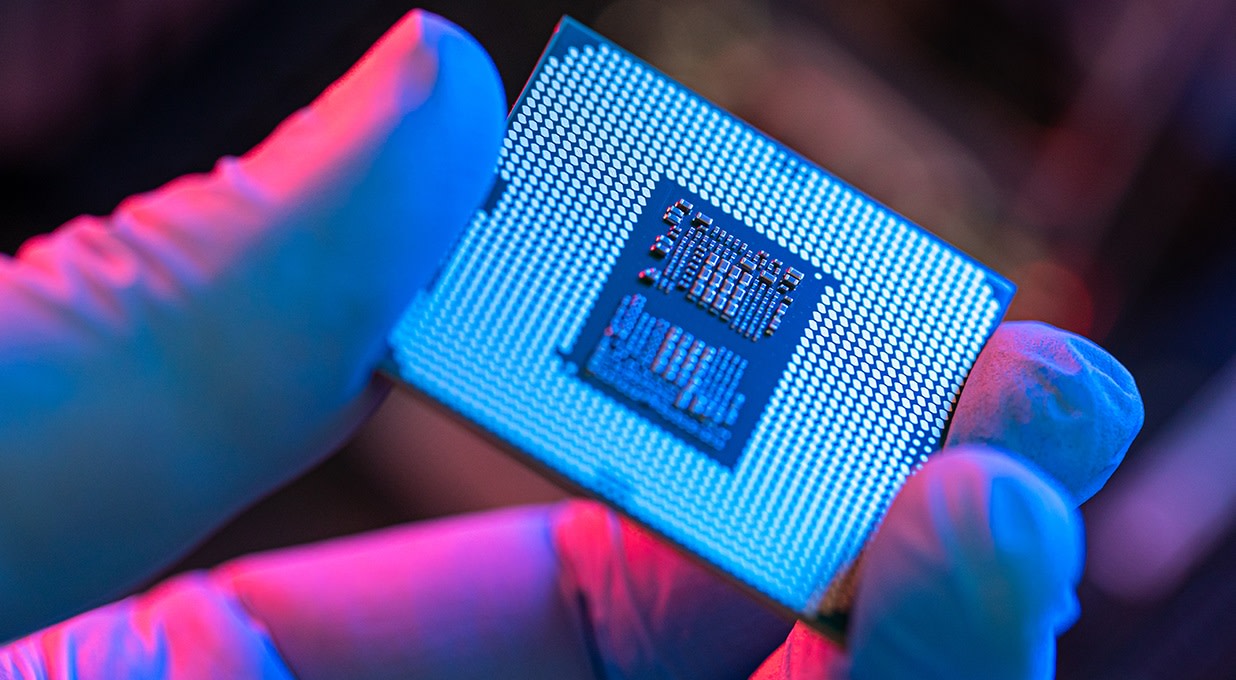ASML’s third-quarter sales were up 11.9% to €7.5bn, ahead of previous guidance, with double-digit growth in both service revenues and system sales.
Order intake was flat at €2.6bn on an annual basis, but more than half of prior quarter levels.
Operating profit grew broadly in line with sales to €2.4bn.
Free cash flow fell from €618mn to €534mn due to lower year-to-date order activity, as well as an increase in inventory levels.
Fourth-quarter sales are expected to land between €8.8bn and €9.2bn, helped by the first sales of the company’s next-generation “High NA” technology. As a result, full-year sales are expected to reach around €28bn, in line with previous guidance.
But a more gradual recovery than previously anticipated in parts of the semiconductor market beyond AI, means that guidance for 2025 sales has been lowered from €30-€40bn to €30-€35bn.
An interim dividend of €1.52 per share was declared.
The shares closed down 15.6% on the day.
Our view
ASML’s near-term growth outlook is being impacted by a reassessment of investment plans by some key customers. Given the continued boom in demand for high-end processors, the softening outlook for the company may be a surprise to some. But the recovery in end products such as PCs, mobile phones, and non-AI specific servers is taking longer to gather pace.
That’s led to sales growth guidance coming down but also gross margin. Meanwhile, the cost-base continues to rise in preparation for future growth. We support management’s decision to hold its nerve but it does mean analysts’ profit forecasts for next year are likely to suffer significant downgrades.
Netherlands-based ASML is the market leader in lithography machines used to make semiconductor chips. Without these, you wouldn't have the chips that power the latest phones, computers or even cars. It continues to push the boundaries of the most advanced tech and competitors look a long way off catching up. We think that leaves it well-placed to benefit from longer-term trends such as artificial intelligence, growing data volumes, and the energy transition.
ASML has previously pointed to an opportunity to more than double its sales and significantly expand margins by the end of the decade. We’re optimistic about the future but the market will be intensely focussed on the revised long-term outlook scheduled to be released on 14 November.
At the last count, the order book stood at €39.0bn. That’s helping to keep hopes alive of a return to order growth in 2025, albeit at a slower rate than previously expected. Order intake is therefore a key metric to follow if growth is to pick up again and the backlog is to be replenished.
There's also the services side of things which covers fixing and upgrading machines - a recurring and growing revenue stream which makes up around 20% of sales.
Equipment sales to China are also an area in focus. In the first half of the year, fears of a further US crackdown on exports saw China leapfrog Taiwan to become the company’s largest territory by revenue, but that tailwind is proving to be short-lived.
Overall, we think ASML's dominant market position leaves it well-placed to benefit from long-term growth trends in the semiconductor industry. The valuation doesn’t look overly demanding and the strong balance sheet should help to ride out peaks and troughs in demand. But while concerns persist about the expansion plans of its end customers, further volatility is to be expected.
Environmental, social and governance (ESG) risk
The semiconductor sector is medium-risk in terms of ESG. Overall, this risk is managed adequately in Europe and North America but has considerable room for improvement in the Asia-Pacific region. Its reliance on highly-specialised workers means labour relations is one of the key risk drivers. Other risks worth monitoring include resource use, business ethics, product governance, and carbon emissions.
ASML’s management of ESG risks is rated strong by Sustainalytics. It is targeting net zero emissions across the value chain by 2040 with credible near-term targets in place for direct and indirect emissions. Its manufacturing sites have received an internationally recognised certification, which suggests a strong environmental management system. There’s also a commitment to reducing hazardous waste. ASML requires a highly skilled workforce and scores well on employee management, with turnover falling from 6% to 3.6% in 2023. Despite its dominant position it has not had any significant antitrust controversies, with its market position protected by innovation and complexity rather than anticompetitive practices.
ASML key facts
All ratios are sourced from Refinitiv, based on previous day’s closing values. Please remember yields are variable and not a reliable indicator of future income. Keep in mind key figures shouldn’t be looked at on their own – it’s important to understand the big picture.
This article is not advice or a recommendation to buy, sell or hold any investment.No view is given on the present or future value or price of any investment, and investors should form their own view on any proposed investment.This article has not been prepared in accordance with legal requirements designed to promote the independence of investment research and is considered a marketing communication.Non - independent research is not subject to FCA rules prohibiting dealing ahead of research, however HL has put controls in place(including dealing restrictions, physical and information barriers) to manage potential conflicts of interest presented by such dealing.Please see our full non - independent research disclosure for more information.


